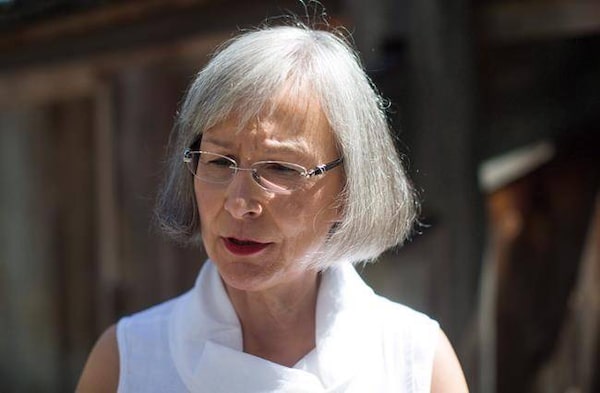
Marion Buller, chief commissioner of the National Inquiry into Missing and Murdered Indigenous Women and Girls, speaks to a reporter after a news conference at Haida House at the Museum of Anthropology, in Vancouver in July, 2016. The head of the national inquiry says government bureaucracy is smothering the commission's ability to meet its deadlines.Darryl Dyck/The Canadian Press
The inquiry that is examining why a disproportionately large number of Canada's Indigenous women are murdered or go missing is asking for an additional two years to complete its work.
Carolyn Bennett, the Minister of Crown-Indigenous Relations, said on Tuesday that the government has been asked to give the problem-plagued commission, which was called a year and a half ago, the extra time.
"Today we received a formal request from the commission for the National Inquiry into Missing and Murdered Indigenous Women and Girls for an extension to its mandate," Dr. Bennett said in a statement. "In the coming weeks, I will be discussing this request with families, Indigenous partners, provincial and territorial counterparts and my cabinet colleagues."
Marion Buller, the inquiry's chief commissioner, said during an afternoon teleconference that all commissioners agree that two more years are necessary to do their work properly and to provide effective recommendations for change.
"Since the truth-gathering process was launched," she said, "the response from families, survivors and Indigenous communities has been overwhelming."
The inquiry has so far heard from 763 witnesses at 11 community hearings and one expert hearing. It has collected an additional 276 statements and received 45 artistic expressions. And about 630 more people still want to testify, Ms. Buller said.
The extra time, if granted, would be used to reach out to vulnerable populations such as Indigenous women and girls in penitentiaries, the homeless, sex workers, and those living in violent circumstances, she said. "We want to hear their stories and their recommendations."
Another two years would also allow the inquiry to hold more institutional and expert hearings and to conduct more research, the chief commissioner said.
The request for more time that was made to Dr. Bennett said the inquiry would need up to $50-million in addition to the $54-million already allocated. Ms. Buller said the exact amount had yet to be determined, but it would depend on the number of additional participants, the number of different locations of hearings, the volume of testimonies and staffing levels.
Ms. Buller said this request for additional time did not mean the inquiry wants to expand its mandate. "What we are doing is expanding the work, making it deeper, making it more probing, making it more encompassing of the work that we want to do," she said.
The commissioners indicated last November, at the release of an interim report, that they would need more than the two years the government had given them. They are now asking to have until Dec. 1, 2020, to complete the job.
The commissioners said they have faced obstacles including cross-jurisdictional issues between the federal government and the provinces, delays caused by federal procurement rules, technological barriers and burdensome federal contracting regimes.
The inquiry has been criticized for failing to communicate adequately with families of missing and murdered women, the public and the media. Some of the families have said the entire process has been flawed and should be restarted.
Elwood Ashewasega, whose mother Shirley and sister Carolyn were killed in 1995, said giving the inquiry another two years would be a good thing, as long as the commissioners perform better than they have to this point.
"They haven't been really listening to elders when they speak, and they haven't been listening to the families. The families are ones who are most important here. They want answers," said Mr. Ashewasega, who added that he has been invited to testify.
"Asking for two more years will help the families in the long run," he said. "But, as of right now, they haven't been doing a good job helping and dealing with the families."